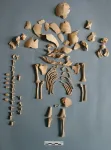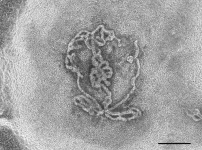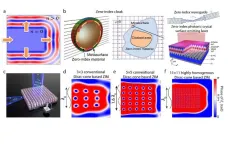(Press-News.org) WASHINGTON, Feb. 20, 2024 — The freshness of animal meat is an essential property determining its quality and safety. With advanced technology capable of preserving food for extended periods of time, meat can be shipped around the globe and consumed long after an animal dies. As global meat consumption rates increase, so too does the demand for effective measures for its age.
Despite the technological advances keeping meat fresh for as long as possible, certain aging processes are unavoidable. Adenosine triphosphate (ATP) is a molecule produced by breathing and responsible for providing energy to cells. When an animal stops breathing, ATP synthesis also stops, and the existing molecules decompose into acid, diminishing first flavor and then safety. Hypoxanthine (HXA) and xanthine are intermediate steps in this transition. Assessing their prevalence in meat indicates its freshness.
In AIP Advances, from AIP Publishing, researchers from the Vietnam Academy of Science and Technology, VNU University of Science, Hanoi University of Science and Technology, and the Russian Academy of Sciences developed a biosensor using graphene electrodes modified by zinc oxide nanoparticles to measure HXA. The team demonstrated the sensor’s efficacy on pork meat.
While many HXA sensing methods currently exist, they can be costly and time-consuming and require specialists.
“In comparison to modern food-testing methods, like high-performance liquid chromatography, gas chromatography, mass spectrometry, atomic and molecular spectroscopy, and nuclear magnetic resonance spectroscopy, biosensors like our sensor offer superior advantages in time, portability, high sensitivity, and selectivity,” said author Ngo Thi Hong Le.
The sensor is produced using a polyimide film, which is converted into porous graphene using a pulsed laser. The added zinc oxide nanoparticles attract the HXA molecules to the electrode surface. When HXA interacts with the electrode, it oxidizes and transfers its electrons, spiking the electrode’s voltage. The linear relationship between HXA and voltage increase enables easy determination of HXA content.
To assess the sensor’s ability, the researchers tested solutions with known quantities of HXA. After the outstanding performance, the researchers measured the biosensor’s practicality using pork tenderloins purchased from a supermarket. The sensor performed with over 98% accuracy, favorable detection range, and low detection limit.
“In Vietnam, pork is the most consumed meat,” said Le. “Therefore, pork quality monitoring is one of the important requirements in the food industry in our country, which is why we prioritized it.”
More than just pork, any meat product can be evaluated by this biosensor.
###
The article “Nonenzymatic electrochemical sensor based on ZnO nanoparticles/porous graphene for the detection of hypoxanthine in pork meat” is authored by Ngo Thi Hong Le, Nguyen Xuan Viet, Nguyen Van Anh, Ta Ngoc Bach, Phung Thi Thu, Nguyen Thi Ngoc, Do Hung Manh, Vu Hong Ky, Vu Dinh Lam, Victor Kodelov, Svetlana Von Gratowski, Nguyen Hai Binh, and Trinh Xuan Anh. It will appear in AIP Advances on Feb. 20, 2024 (DOI: 10.1063/5.0190293). After that date, it can be accessed at https://doi.org/10.1063/5.0190293.
ABOUT THE JOURNAL
AIP Advances is an open access journal publishing in all areas of physical sciences—applied, theoretical, and experimental. The inclusive scope of AIP Advances makes it an essential outlet for scientists across the physical sciences. See https://aip.scitation.org/journal/adv.
###
END
Fresh meat: New biosensor accurately and efficiently determines meat freshness
Employing a porous graphene electrode with zinc oxide nanoparticles, biosensor identifies aging byproducts in meat
2024-02-20
ELSE PRESS RELEASES FROM THIS DATE:
Large, diverse genetic study of glaucoma implicates vascular and cancer-related genes
2024-02-20
An international genetic study using multiancestry biobanks has identified novel genetic locations associated with primary open-angle glaucoma (POAG), the most common type of glaucoma and the leading cause of irreversible blindness globally. The findings, published Feb. 20 in Cell Reports Medicine, detail ancestry- and sex-specific genetic loci associated with POAG and implicate vascular and cancer-related genes in POAG risk.
“Although there has been significant progress using genome-wide association studies (GWAS) to explore the genetic pathophysiology of glaucoma in humans, there is still a lack of understanding of the underlying ...
HPV vaccination among young adults before and during the pandemic
2024-02-20
About The Study: The results of this study suggest that human papillomavirus (HPV) vaccination coverage among young adults did not increase during the COVID-19 pandemic compared with prior years. This finding likely reflects pandemic-related disruptions in initiating the HPV vaccine among young adults.
Authors: Kalyani Sonawane, Ph.D., of the Medical University of South Carolina in Charleston, is the corresponding author.
To access the embargoed study: Visit our For The Media website at this link https://media.jamanetwork.com/
(doi:10.1001/jamanetworkopen.2023.56875)
Editor’s Note: Please see the article for ...
Historical redlining, persistent mortgage discrimination, and race in breast cancer outcomes
2024-02-20
About The Study: In a study of 1,764 women with breast cancer, living in a historically redlined area was associated with increased odds of a diagnosis of estrogen receptor–negative breast cancer in non-Hispanic Black women and increased odds of late-stage diagnosis in non-Hispanic white women. Persistent mortgage discrimination was associated with an increase in breast cancer mortality in non-Hispanic white women, and non-Hispanic Black women were more likely to die of breast cancer no matter where they lived.
Authors: Jasmine M. Miller-Kleinhenz, Ph.D., of Emory University in Atlanta, is the corresponding author.
To ...
Ancient genomes reveal Down Syndrome in past societies
2024-02-20
For many years, researchers at MPI-EVA have been collecting and analyzing ancient DNA from humans who lived during the past tens of thousands of years. Analyzing these data has allowed the researchers to trace the movement and mixing of people, and even to uncover ancient pathogens that affected their lives. However, a systematic study of uncommon genetic conditions had not been attempted. One of those uncommon conditions, known as Down Syndrome, affects nowadays around one in 1,000 births.
To their surprise, Adam “Ben” Rohrlach and colleagues identified six individuals ...
Can a single brain region encode familiarity and recollection?
2024-02-20
NEW YORK, NY — The human brain has the extraordinary ability to rapidly discern a stranger from someone familiar, even as it can simultaneously remember details about someone across decades of encounters. Now, in mouse studies, scientists at Columbia's Zuckerman Institute have revealed how the brain elegantly performs both tasks.
“These findings are the first evidence that a single population of neurons can use different codes to represent novel and familiar individuals,” said co-corresponding author Stefano Fusi, PhD, professor of neuroscience at Columbia’s Vagelos College of Physicians and ...
Pesticides found in kale but at low risk levels
2024-02-20
Kale fans can rest easy knowing pesticides used to grow the hearty greens are unlikely to end up in their salads or smoothies, a new chemical analysis of the superfood suggests.
Conducting novel tests that provide the most complete picture to date of a crop’s chemical makeup, the Johns Hopkins–led team found several pesticides and compounds in Maryland-farmed kale—but no cause for alarm.
“We do see minute traces of pesticides in the kale, but the levels we found are so much lower ...
Stress during pregnancy can lead to early maturation of first-born daughters
2024-02-20
Key takeaways
A UCLA-led research team found a correlation between certain aspects of early puberty in first-born daughters and high levels of prenatal stress in their mothers.
The researchers did not find the same result in boys or in daughters who were not first-born.
This early maturation may enable a first-born daughter to help her mother rear her other children successfully, according to UCLA anthropologist Molly Fox.
A UCLA-led team of researchers has found a correlation between early signs of adrenal puberty in first-born daughters ...
Bar-Ilan University researchers produce “laboratory testicles”
2024-02-20
The testis is responsible for sperm production and testosterone synthesis. Abnormalities in testis development and function lead to disorders of sex development (DSD) and male infertility. Currently, no in vitro system exists for modeling the testis.
Dr. Nitzan Gonen, a researcher specializing in the process of fetal sex determination, together with research students Aviya Stopel, Cheli Lev and Stav Dahari, has succeeded in creating "laboratory testicles" that may significantly advance understanding of the mechanisms involved in sex determination and provide solutions for male infertility, which affects one in 12 men worldwide.
The artificial testicles ...
Zero-index metamaterials and the future
2024-02-20
In the realm of materials science, electromagnetic (EM) metamaterials have emerged as a revolutionary class of engineered composites capable of manipulating electromagnetic waves in ways never before possible. Unlike their naturally occurring counterparts, EM metamaterials derive their extraordinary properties from their unique structural arrangements, allowing them to exhibit unattainable electromagnetic characteristics in conventional materials.
One of the most fascinating characteristics of EM metamaterials lies in the realm of zero-index metamaterials (ZIMs). ZIMs possess the ...
If your TV spoke to you, would you buy it? Study finds people spend more on some “talking products”
2024-02-20
BLOOMINGTON, Ind. – In the classic Disney film “Beauty and the Beast,” Lumière, the candelabra character, famously sings with Mrs. Potts, a tea pot, “Be our guest, be our guest. Put our service to the test. Tie your napkin round your neck, Cherie, and we provide the rest.”
When the 1991 Oscar-nominated song co-written by Indiana University alumnus Howard Ashman was released, it hardly seemed realistic that a product could sing its own praises and sell itself to consumers. But artificial intelligence today makes ...
LAST 30 PRESS RELEASES:
Scientists show how to predict world’s deadly scorpion hotspots
ASU researchers to lead AAAS panel on water insecurity in the United States
ASU professor Anne Stone to present at AAAS Conference in Phoenix on ancient origins of modern disease
Proposals for exploring viruses and skin as the next experimental quantum frontiers share US$30,000 science award
ASU researchers showcase scalable tech solutions for older adults living alone with cognitive decline at AAAS 2026
Scientists identify smooth regional trends in fruit fly survival strategies
Antipathy toward snakes? Your parents likely talked you into that at an early age
Sylvester Cancer Tip Sheet for Feb. 2026
Online exposure to medical misinformation concentrated among older adults
Telehealth improves access to genetic services for adult survivors of childhood cancers
Outdated mortality benchmarks risk missing early signs of famine and delay recognizing mass starvation
Newly discovered bacterium converts carbon dioxide into chemicals using electricity
Flipping and reversing mini-proteins could improve disease treatment
Scientists reveal major hidden source of atmospheric nitrogen pollution in fragile lake basin
Biochar emerges as a powerful tool for soil carbon neutrality and climate mitigation
Tiny cell messengers show big promise for safer protein and gene delivery
AMS releases statement regarding the decision to rescind EPA’s 2009 Endangerment Finding
Parents’ alcohol and drug use influences their children’s consumption, research shows
Modular assembly of chiral nitrogen-bridged rings achieved by palladium-catalyzed diastereoselective and enantioselective cascade cyclization reactions
Promoting civic engagement
AMS Science Preview: Hurricane slowdown, school snow days
Deforestation in the Amazon raises the surface temperature by 3 °C during the dry season
Model more accurately maps the impact of frost on corn crops
How did humans develop sharp vision? Lab-grown retinas show likely answer
Sour grapes? Taste, experience of sour foods depends on individual consumer
At AAAS, professor Krystal Tsosie argues the future of science must be Indigenous-led
From the lab to the living room: Decoding Parkinson’s patients movements in the real world
Research advances in porous materials, as highlighted in the 2025 Nobel Prize in Chemistry
Sally C. Morton, executive vice president of ASU Knowledge Enterprise, presents a bold and practical framework for moving research from discovery to real-world impact
Biochemical parameters in patients with diabetic nephropathy versus individuals with diabetes alone, non-diabetic nephropathy, and healthy controls
[Press-News.org] Fresh meat: New biosensor accurately and efficiently determines meat freshnessEmploying a porous graphene electrode with zinc oxide nanoparticles, biosensor identifies aging byproducts in meat








